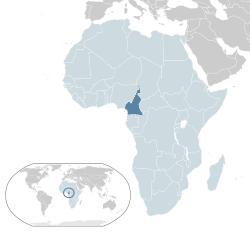Republic of Cameroon République du Cameroun (French) | |
|---|---|
| Motto: "Paix – Travail – Patrie" (French) "Peace – Work – Fatherland" | |
| Anthem: "Chant de Ralliement" (French) "The Rallying Song" | |
| Capital | Yaoundé 3°52′N 11°31′E / 3.867°N 11.517°E |
| Largest city | Douala |
| Official languages | English French |
| Ethnic groups (2022) |
|
| Religion (2022) |
|
| Demonym(s) | Cameroonian |
| Government | Unitary dominant-party presidential republic under a dictatorship |
| Paul Biya | |
| Joseph Ngute | |
| Marcel Niat Njifenji | |
| Cavayé Yéguié Djibril | |
| Legislature | Parliament |
| Senate | |
| National Assembly | |
| Formation | |
| 17 August 1884 | |
Partition | 20 July 1916 |
Independence of French Cameroon from France | 1 January 1960 |
Independence of Southern Cameroons from the United Kingdom, establishment of federal republic | 1 October 1961 |
Unitary state | May 1972 |
| Area | |
Total | 475,442 km2 (183,569 sq mi) (53rd) |
Water (%) | 0.57 |
| Population | |
2024 estimate | 30,966,105 (52nd) |
Density | 39.7/km2 (102.8/sq mi) |
| GDP (PPP) | 2024 estimate |
Total | |
Per capita | |
| GDP (nominal) | 2024 estimate |
Total | |
Per capita | |
| Gini (2021) | medium inequality |
| HDI (2022) | medium (151st) |
| Currency | Central African CFA franc (XAF) |
| Time zone | UTC+1 (WAT) |
| Date format | dd/mm/yyyy yyyy/mm/dd |
| Calling code | +237 |
| ISO 3166 code | CM |
| Internet TLD | .cm |
| |
Table of Contents
Introduction to Data Breaches
In today’s digital age, data breaches have become increasingly prevalent, affecting individuals, organizations, and governments alike. A data breach is defined as an incident where unauthorized access is gained to confidential or sensitive data, often resulting in its exposure, alteration, or destruction. Such breaches can consist of various violations, ranging from hacking attacks and malware infections to improper disposal of documents or accidental leaks. Each type of violation poses unique risks and challenges, highlighting the complexity of data security in a rapidly evolving technological landscape.
Cameroon, like many other nations, is experiencing significant technological advancements that contribute to its vulnerability to data breaches. As internet usage rises, more individuals and businesses rely on digital platforms to store, manage, and share sensitive information. This growing reliance increases the risk of cyber threats and data vulnerabilities. Furthermore, the proliferation of mobile devices and internet connectivity in Cameroon presents additional challenges, as these technologies are often associated with weaker security measures and inadequate data protection practices.
The socio-economic context of Cameroon also plays a crucial role in its susceptibility to data breaches. Limited public awareness about data protection, a lack of robust regulatory frameworks, and insufficient investments in cybersecurity infrastructure create an environment in which cyber criminals can operate more easily. Additionally, the rising trend of digitization among local businesses without corresponding security measures intensifies the risks of data breaches.
Addressing these vulnerabilities is critical for safeguarding sensitive information and maintaining public trust. By understanding the nature of data breaches and the factors contributing to their prevalence, stakeholders can better prepare for and mitigate the impact of such incidents. Awareness and proactive measures are essential steps toward fostering a more secure digital environment in Cameroon.
Legal Framework Governing Data Breaches in Cameroon
The protection of personal data and the management of data breaches in Cameroon are primarily governed by a combination of national laws and international agreements. The Cybersecurity Law, enacted in 2010, provides a crucial legal framework for the protection of data against unauthorized access, theft, and various forms of cybercrime. This law outlines the responsibilities of entities in collecting, processing, and storing personal data while emphasizing the necessity for implementing security measures to protect this data.
Under the Cybersecurity Law, organizations are mandated to notify relevant authorities in the event of a data breach. This obligation promotes transparency and accountability, ensuring that affected individuals can take appropriate actions to mitigate potential damage resulting from the breach. The law stipulates that data processors and controllers must implement proper security protocols and procedures to prevent breaches, thus safeguarding personal and sensitive data. Failure to comply may result in severe penalties, promoting strict adherence among stakeholders.
Furthermore, Cameroon is a signatory to various international treaties that emphasize data protection. Cameroon’s commitment to the African Union’s Agenda 2063 includes principles aimed at enhancing cybersecurity and protecting personal information. These international agreements foster cooperation between nations to combat cyber threats and improve data management practices. The respect for international standards demonstrates Cameroon’s recognition of the global implications of data breaches, compelling local organizations to align with established best practices.
In light of the evolving landscape of data management, it is crucial for organizations operating in Cameroon to remain aware of both national and international legal obligations governing data protection. Continuous updates to these legal frameworks may occur in response to the rapidly changing nature of technology and cyber threats, necessitating constant vigilance and compliance by stakeholders in the data ecosystem.
Notification Requirements for Data Breaches
In Cameroon, organizations are mandated to adhere to specific notification requirements in the event of a data breach. These requirements aim to ensure transparency and prompt communication with affected parties and regulatory bodies. One of the primary obligations is to notify impacted individuals whose personal data has been compromised. This notification should occur without undue delay, ideally within 72 hours of the organization becoming aware of the breach. The goal is to provide affected individuals with sufficient information to enable them to take appropriate precautions to protect their personal information.
In addition to notifying affected individuals, organizations are also required to inform the relevant regulatory bodies. This is essential for maintaining compliance with national laws and regulations regarding data protection. Organizations must provide a comprehensive report outlining the nature of the breach, the data involved, and measures taken to mitigate its impact. This notification to regulatory authorities should also occur without delay, ensuring that authorities can take necessary actions to regulate and oversee the incident.
The format of the notifications is crucial to ensure clarity and understanding. Notifications should be written in straightforward language, avoiding technical jargon that could confuse recipients. Organizations should consider using various communication channels, such as emails, official letters, or, where appropriate, public announcements. By offering multiple communication methods, organizations can reach a wider audience effectively.
Best practices for notification include maintaining transparency throughout the process, providing frequent updates, and offering guidance on additional steps individuals can take to safeguard their information. By prioritizing clear communication and support, organizations can help mitigate panic among stakeholders, fostering trust and confidence in their crisis management efforts. These practices are vital for not only informing affected parties but also for releasing an organization’s accountability and commitment to data protection standards.
Penalties for Non-Compliance with Data Breach Protocols
Organizations that fail to comply with established data breach notification protocols in Cameroon face significant consequences. These penalties can manifest in various forms, including legal repercussions, financial fines, and damage to an organization’s reputation. It is crucial for entities to understand the importance of adhering to data protection regulations to mitigate these risks and ensure accountability.
One of the most immediate consequences of non-compliance is the imposition of fines. The Cameroonian legal framework outlines specific penalties for organizations that neglect their obligation to promptly notify affected parties in the event of a data breach. These fines can vary, but they often reflect the severity of the breach and the extent of the organization’s negligence. Additionally, recurrent violations may lead to more significant financial liabilities, further impacting the organization’s bottom line.
Beyond financial penalties, organizations may face sanctions from regulatory bodies tasked with overseeing data protection laws. These sanctions can include operational restrictions, mandatory audits, and even suspension of business activities until compliance is achieved. Such actions not only hamper business operations but also create a burden that organizations must address to restore their standing with regulatory authorities.
The repercussions of non-compliance extend beyond legal and financial penalties; reputational damage can have long-lasting implications for organizations. A data breach that is poorly managed can lead to a loss of trust among clients, stakeholders, and the general public. Once an organization’s reputation is tarnished, it may take significant time and effort to rebuild, which can deter potential clients and business opportunities.
Ultimately, the legal penalties, sanctions, and reputational harm associated with non-compliance with data breach protocols underscore the necessity for organizations to prioritize data protection. Committing to established procedures not only aids in avoiding these penalties but also fosters a culture of responsibility and trust in the organization’s commitment to safeguarding sensitive information.
Corrective Actions After a Data Breach
Following a data breach, organizations in Cameroon must undertake a series of corrective actions to effectively manage the incident and mitigate its effects. The initial response is critical and should prioritize containing the breach. This involves isolating the affected systems to prevent further unauthorized access or data loss. Technical teams should work swiftly to identify the vulnerability that led to the breach and apply fixes to secure the system.
Once the immediate threat is contained, organizations must assess the extent of the damage. This assessment involves determining what information was compromised and understanding the impact of the breach on both the organization and the affected individuals. During this phase, it is vital to analyze the data flow and identify any unauthorized access to sensitive information. This assessment should be documented thoroughly, as it will be crucial for reporting purposes and for informing affected parties.
Notifying affected individuals and relevant authorities, such as data protection regulators, is a necessary step in the corrective process. In Cameroon, timely communication can not only help rebuild trust but also comply with legal requirements concerning data breaches. Organizations should prepare clear and concise notifications that outline the specifics of the breach, the data involved, and the measures being taken to remedy the situation.
The long-term measures taken after a data breach are equally as important as the immediate response. Organizations should revise their security policies to close any gaps identified during the breach. Training programs should be implemented to educate staff on data security best practices and the importance of adhering to established protocols. Additionally, investing in new technologies, such as advanced encryption and intrusion detection systems, can strengthen defenses against future data breaches, ensuring a robust incident response strategy is maintained.
Impact Assessment and Risk Management
Conducting an impact assessment following a data breach is a crucial step in understanding the ramifications of the incident. A thorough evaluation allows organizations to determine the scope of the breach, including the type and sensitivity of the compromised data, which may range from personal information to corporate secrets. Identifying vulnerabilities that led to the breach not only helps mitigate immediate damage but also aids in improving security protocols to prevent future occurrences.
Organizations should begin the impact assessment process by gathering relevant data surrounding the breach incident. This includes documenting the timeline of events, the systems affected, and the number of individuals impacted. By systematically analyzing these factors, organizations can gain insights into how the breach occurred and which security measures failed. This critical evaluation should encompass not only the technical aspects but also the human elements, such as employee awareness and training on data protection practices.
Once a clear picture of the breach is established, organizations can formulate a risk management framework designed to address identified vulnerabilities. This framework typically includes incident response strategies, security policy revisions, employee training programs, and ongoing monitoring practices. Importantly, it should be aligned with existing data protection laws to ensure legal compliance. Incorporating risk management principles into organizational culture empowers staff to recognize potential threats and respond effectively, fostering a proactive environment in which data security is prioritized.
Therefore, the importance of conducting an impact assessment and implementing a risk management framework cannot be overstated. These practices play a vital role in mitigating future risks and ensuring a resilient response to potential data breaches, thereby safeguarding both organizational integrity and customer trust.
Role of Government and Regulatory Bodies
The government of Cameroon, along with various regulatory bodies, plays a pivotal role in managing data breach incidents to safeguard personal information and enhance cybersecurity within the nation. Their responsibilities encompass monitoring compliance, enforcing penalties, and guiding businesses and organizations on best practices for data protection. Such involvement is essential, especially as the digital landscape continues to evolve rapidly.
One of the primary responsibilities of the government is to establish a legal framework that governs data protection. This includes formulating relevant laws and regulations that outline the obligations of organizations concerning personal data handling. The enforcement of these regulations is typically carried out by designated regulatory bodies tasked with oversight. These entities are crucial in ensuring that businesses adhere to the aforementioned laws, thereby promoting a culture of data privacy and security.
Moreover, when breaches occur, the government and regulatory agencies are responsible for investigating incidents to ascertain their causes and impacts. This facilitates the imposition of appropriate penalties on organizations that fail to comply with established data protection regulations. Such measures not only serve as deterrents against negligence but also promote accountability among businesses handling sensitive information.
Furthermore, regulatory bodies often serve as a resource for companies by providing guidance on industry best practices. This guidance includes recommendations for implementing robust security measures, employee training, and incident response strategies. By actively engaging with businesses, these bodies help to foster an environment that prioritizes data protection. Consequently, organizations are better equipped to manage potential breaches, minimizing their risks and enhancing trust among consumers.
In conclusion, the collaboration between the government of Cameroon and regulatory bodies is indispensable in addressing data breaches. By laying down guidelines, enforcing penalties, and providing essential support, they contribute significantly to the overall data protection landscape in the country.
Case Studies: Notable Data Breaches in Cameroon
Data breaches have become a pressing concern in Cameroon, impacting various sectors and raising significant issues regarding data protection and management. One notable case occurred at the National Institute of Statistics (NIS) in 2021, where sensitive demographic data of millions of citizens was exposed. This breach stemmed from inadequate security protocols and a lack of staff training on data protection. The consequences of this incident were profound, leading to a public outcry and raising awareness about the importance of implementing robust data management practices.
Another significant breach took place in the banking sector, affecting a prominent bank in Cameroon. In this incident, cybercriminals gained unauthorized access to customer accounts, resulting in financial losses for both the bank and its clients. The attack exploited vulnerabilities in the bank’s online banking system, highlighting critical gaps in their cyber security framework. As a result, the bank had to invest heavily in improving its data breach management procedures and training its employees on recognizing potential threats.
In the education sector, a university faced a data breach that compromised the personal information of students and faculty members. This breach occurred due to an unpatched vulnerability in the university’s information systems. The incident underscored the necessity for educational institutions to prioritize data security and actively engage in routine assessments of their data management practices. In the aftermath, the university instituted stricter access controls and heightened awareness campaigns to ensure all stakeholders understood the significance of data protection.
The occurrence of these breaches emphasizes the need for a comprehensive and proactive approach to data breach management in Cameroon. Organizations must learn from these cases and implement effective strategies to safeguard their information assets, as the implications of data breaches can extend far beyond immediate financial losses, affecting trust and organizational reputation as well.
Best Practices for Data Breach Prevention
In today’s digital landscape, data security has become paramount, particularly in regions like Cameroon where organizations are increasingly reliant on technology. Preventing data breaches requires a multifaceted approach that incorporates robust security measures, regular auditing, employee education, and a well-structured incident response plan.
First and foremost, organizations should implement strong data security measures. This includes the use of advanced firewalls, encryption protocols, and secure access controls to protect sensitive information from unauthorized access. Regular updates and patches for software and systems are crucial to minimize vulnerabilities that cybercriminals may exploit.
Conducting regular audits is another essential practice. These audits help organizations identify potential weaknesses in their data security systems and rectify them before they can be exploited. This proactive approach not only enhances security but also ensures compliance with applicable laws and regulations concerning data protection.
Staff training and awareness programs are particularly vital in preventing data breaches. Employees are often the first line of defense against cyber threats; hence, it is critical to educate them about common risks, such as phishing scams and social engineering tactics. Regular training sessions can empower employees to recognize suspicious activity and respond appropriately, thereby reducing the likelihood of breaches caused by human error.
Additionally, organizations must develop a comprehensive incident response plan that is both effective and compliant with legal requirements. This plan should outline clear steps to follow in the event of a data breach, including communication protocols, risk assessment procedures, and measures to mitigate damage. Such a plan not only helps minimize the impact of a breach but also demonstrates to stakeholders that the organization is committed to data protection.
By adopting these best practices, organizations in Cameroon can significantly reduce the risk of data breaches, safeguarding their operations and maintaining the trust of their stakeholders.



